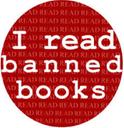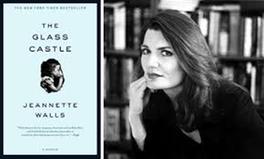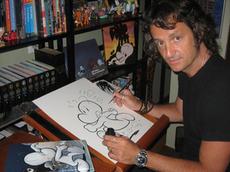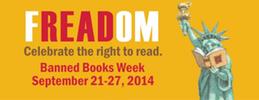 Which banned book am I? How many banned books have I read? How well do I know my banned books? How scandalous is my reading history? Banned Books Week raises a lot of questions (and eyebrows) annually. In the midst of all the events, media coverage, infographics, lists and quizzes, I found myself collecting some words of Banned Books Week wisdom during the past few days.
Which banned book am I? How many banned books have I read? How well do I know my banned books? How scandalous is my reading history? Banned Books Week raises a lot of questions (and eyebrows) annually. In the midst of all the events, media coverage, infographics, lists and quizzes, I found myself collecting some words of Banned Books Week wisdom during the past few days.
But let's begin with this year's epically bad timing prize, which goes to Highland Park High School in Texas, where seven titles assigned as required class reads were suspended on the ironic eve of Banned Books Week after parents complained about content. In addition to Garth Stein's The Art of Racing in the Rain (which students were reading at the time of the ban), the list includes The Glass Castle by Jeannette Walls, who is scheduled to be keynote speaker at the district's annual literary festival in February. Ouch. "My book has ugly elements to it, but it's about hope and resilience, and I don't know why that wouldn't be an important message," Walls said. "Sometimes you have to walk through the muck to get to the message.... What I worry is that in order to protect them, we may be taking away the tools they need to protect themselves later on."
"My book has ugly elements to it, but it's about hope and resilience, and I don't know why that wouldn't be an important message," Walls said. "Sometimes you have to walk through the muck to get to the message.... What I worry is that in order to protect them, we may be taking away the tools they need to protect themselves later on."
In keeping with the spirit of autumn, here are a few more Banned Books Week quotes I harvested:
Benjamin Rybeck, event coordinator at Brazos Bookstore, Houston, Tex.: "I wrote about The Giver. It seems to me that the exact kind of young-adult novel that gets banned for being 'dangerous' ends up being the exact kind of novel that would wind up making a teenager read more books, and read more deeply. I don't know if it's my favorite banned book, but I remember reading it as a teenager and being kind of blown away, not knowing books could ask darker or stranger questions."
Tony Diaz of Librotraficante: "Every week is banned books week for Chicanos.... The Arizona book banners aren't afraid that the next Julius Caesar will simply go by the name 'Julio.' They're scared that their next governor might."
Carolyn Chipley-Foster, media specialist at Muriel Williams Battle High School, Columbia, Mo., which is rewarding students who check out one of its top 10 banned books: "We support everyone's right to read and believe in the power of change that books can bring. We like to bring in new ideas and share ideas so that students can have the opportunity to grow their brains."
Dav Pilkey, author of the Captain Underpants series (#1 on the ALA's most banned and challenged book list): "So what's the big deal? Well, most of it boils down to the fact that not every book is right for every person. There are some adults out there who are not amused by the things that make most children laugh, and so they try to stomp these things out. We've all met people like that, haven't we?"

|
|
| Jeff Smith | |
Jeff Smith, author of the graphic album series BONE (#10 on the 2013 list): "Reading lets our imagination grow, and helps us find the paths that will inspire us for the rest of our lives. That kind of inspiration should never be taken away. But when a book is banned, that's exactly what happens."
David L. Ulin in Jacket Copy: "First, I think, we must acknowledge that books can be dangerous.... When a parent group goes after Dav Pilkey, for instance--or John Green, or Toni Morrison--it's not necessarily because they're ignorant, that if they knew more, or understood more, they would see things through a more accepting lens. They understand the power of books and are reacting to it, if not in the manner we might prefer."
Laila Lalami at the PEN America website: "I wonder if the deeper reason for the ban is that The Bluest Eye makes some people uncomfortable. It says plainly what many among us refuse to admit: that our aesthetics are not entirely our own, but are at least in part a function of the racist culture in which we live.... Rather than 'protecting' high school students from The Bluest Eye, educators can use the novel to start discussions about body image, self-esteem and the power of cultural narrative." I'll end with a little historical perspective from a September 1936 New York Times article on the removal of novels by Victor Hugo and Alexander Dumas from the required reading list at three high schools in Bridgeport, Conn.
I'll end with a little historical perspective from a September 1936 New York Times article on the removal of novels by Victor Hugo and Alexander Dumas from the required reading list at three high schools in Bridgeport, Conn.
"I feel it is rather ridiculous to deprive children of very fine pieces of literature because one particular sect has some objections to a few passages," said Mrs. William Cohn, president of the Parent-Teacher Association. "I looked at the books last night after I learned they had been removed from the list. There are a few things which if you are very fussy, might be objected to, but the good features of the books, the beauty of the literature, far over-balance the objectionable." Or, to be more succinct, FREADOM. --Robert Gray, contributing editor (column archives available at Fresh Eyes Now)

